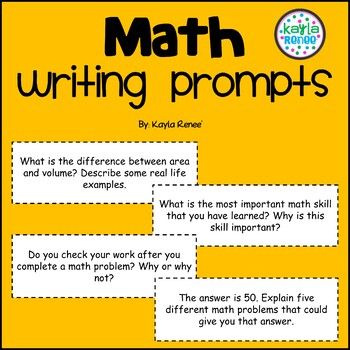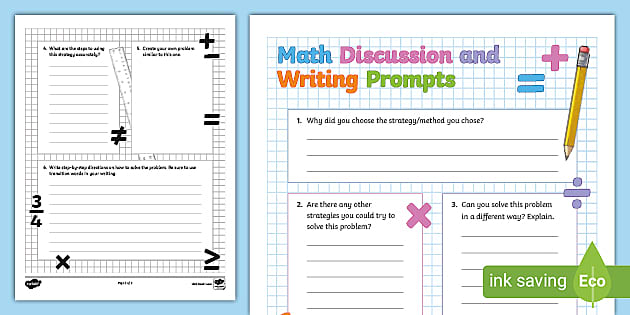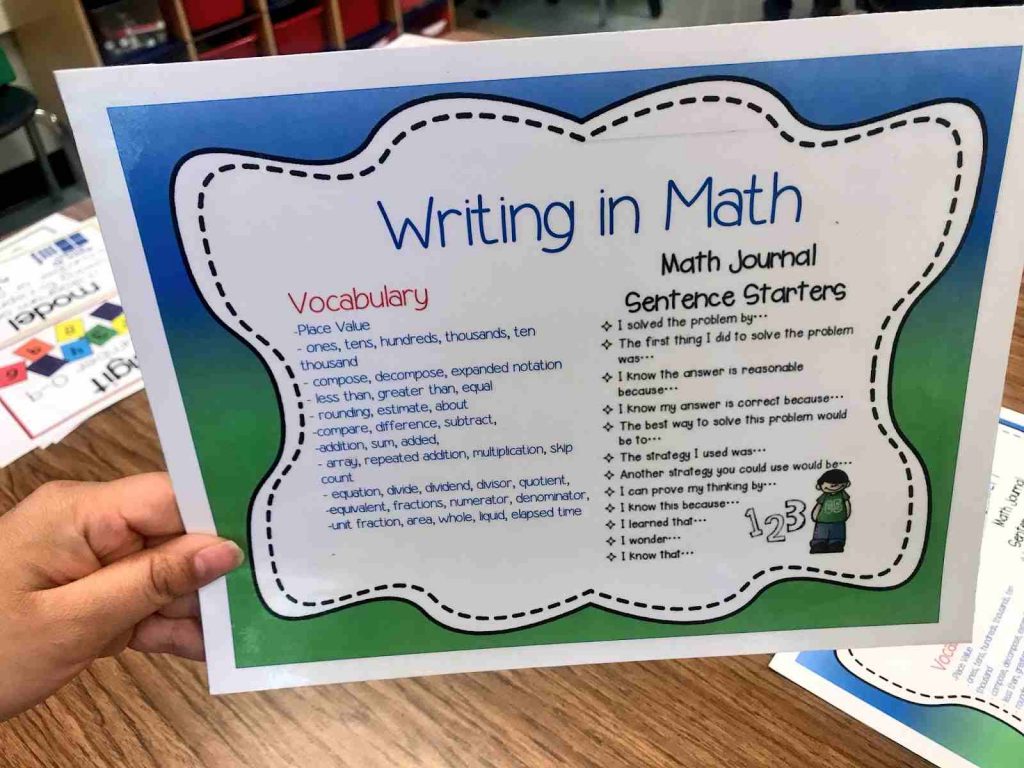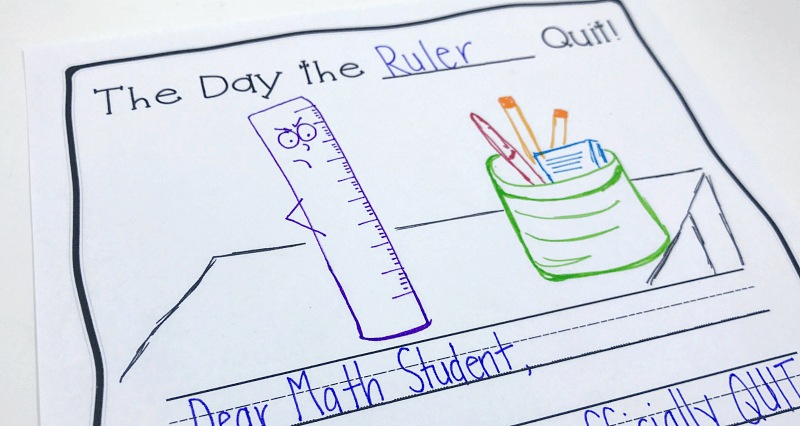Mathematics is more than just numbers and equations; it’s a vital part of our education system that helps students develop critical thinking and problem-solving skills. But how can we make learning math more engaging and less intimidating? This is where creative math writing prompts come into play.
Math & ELA | PreK To Grade 5
Kids see fun.
You see real learning outcomes.
Watch your kids fall in love with math & reading through our scientifically designed curriculum.
Parents, try for free Teachers, use for free
Math writing prompts are unique tools that blend the world of numbers with the art of words. They are about solving problems explaining concepts, exploring ideas, and expressing thoughts in written form. This approach makes math more relatable and interesting for students of all ages.
Educators can transform how students perceive and interact with mathematics by integrating these prompts into math lessons. It’s not just about finding the right answer anymore; it’s about understanding the ‘why’ and ‘how’ behind it.
Looking for a way to make math engaging and fun for your students? SplashLearn offers a world of interactive math games that turn challenging concepts into exciting adventures. From basic addition to complex algebra, we have something for every learner.
10 Best Math Writing Prompts For Kids (Grades 1-5)

1. Reflect on a Math Challenge: Think about a time when you faced a difficult math problem. How did you solve it? What did you learn from this experience?
This prompt encourages students to reflect on their problem-solving skills and resilience in mathematics. It helps them recognize their growth and learning process in the subject.
2. Math in Everyday Life: Write about how you use math daily. Give specific examples, like shopping, cooking, or planning a trip.
This exercise helps students see the practical applications of math, making the subject more relevant and interesting to their everyday experiences.
3. Your Math Hero: Who is your math hero (it could be a teacher, a famous mathematician, or someone else) and why do they inspire you?
By identifying a math hero, students can explore different aspects of mathematics and its impact while also finding personal inspiration and role models in the field.
4. Math and Future Dreams: How will math be important in your future career or life goals?
This prompt encourages students to connect math with their future aspirations, highlighting the subject’s importance in a wide range of fields and personal ambitions.
See how math shapes the future! Join SplashLearn for games that make learning math fun and relevant.
5. Dream Math Teacher: Imagine you could design your dream math teacher. What qualities would they have? What kind of math games or activities would they do with the class?
Imagining a dream math teacher allows children to think about the qualities that make learning enjoyable and effective. This prompt fosters creativity and provides insights into how they prefer to learn and engage with math.
Create your dream math learning experience with SplashLearn’s engaging games and activities.
6. Math and Creativity: Do you think math can be creative? Give examples of how creativity is used in solving math problems.
This prompt challenges the stereotype that math is purely analytical, encouraging students to see the creative aspects of problem-solving in mathematics.
7. A New Math Concept: Describe a new math concept you learned recently and how it has changed your perspective on math.
Reflecting on recent learning helps students consolidate their knowledge and appreciate the evolving nature of their understanding of math.
8. Math and Sports: Choose your favorite sport and write about how math is used in it. Think about scoring, measuring distances, or calculating averages.
Linking math with sports helps children see the practical applications of math in areas of interest. It demonstrates how math is theoretical and a vital part of activities they enjoy and understand.
9. Your Favorite Math Topic: What is your favorite topic in math and why? Explain what makes it interesting to you.
Encouraging students to identify and articulate what they enjoy about math can enhance their engagement and interest in the subject.
10. Building with Geometry: If you could build anything with geometric shapes, what would you build and why?
This prompt encourages kids to use their knowledge of geometric shapes in a practical, creative task. It helps them understand the role of geometry in design and construction, fostering both creativity and spatial awareness.
Art and geometry are a perfect pair. Delve into the geometric beauty of art and shape with fun games.
10 Math Writing Prompts For Middle School Children (Grades 6-8)

11. Math in Nature: Explore how math is used in nature. Write about patterns, symmetry, or shapes you find.
This prompt encourages students to observe and explore the natural world through a mathematical lens, focusing on patterns, symmetry, and shapes. It helps them understand the omnipresence of math in the environment.
12. The Algebra of Everyday Life: How do you use algebra daily? Give examples.
Students are encouraged to identify and articulate how algebra is used in daily activities. This prompt helps them connect abstract mathematical concepts with real-world applications.
Apply algebra in real life with engaging games. Solve Real-Life Problems Now!
13. Math in Cooking: If you have helped in the kitchen, think about how you use math in cooking or baking. Write about an experience where you used measurements or fractions.
This prompt helps children understand the importance of measurements and fractions in cooking, showing math’s role in everyday tasks. It’s a practical way to apply mathematical concepts in a fun, engaging setting.
14. A World Without Zero: Imagine a world where the number zero does not exist. How would things change?
Imagining a world without the number zero challenges students to think about the fundamental role of this number in mathematics and everyday life. It enhances their understanding of the number system.
15. Building with Math: Think about being an architect or a builder who uses math daily. Write about a dream building or structure you would like to design. How would you use math to plan and build it?
This prompt helps children understand the importance of math in architecture and construction. It encourages practical and creative thinking, showing how math is essential in designing and building structures.
16. The Biography of a Mathematician: Write a short biography of a famous mathematician.
Writing a mathematician’s biography allows students to explore the history of mathematics and the contributions of individuals to the field, fostering a deeper appreciation and context for mathematical concepts.
17. If I Were a Math Problem: If you were a complex math problem, what would you be and why?
This creative prompt encourages students to think abstractly and metaphorically about mathematics, fostering a deeper, more personal engagement with mathematical concepts.
18. Math in Music: Explore the relationship between math and music.
Exploring the relationship between math and music helps students understand rhythm, scales, and patterns in music, highlighting the interdisciplinary nature of math.
19. The Future of Math: Predict how math will change in 50 years.
Predicting the future of math encourages students to think critically about the evolution of mathematical concepts and technology, fostering forward-thinking and innovation.
20. Math in Space: Astronauts use math in space. Write about how you think they use math on the International Space Station or when exploring other planets.
By exploring how astronauts use math, this prompt expands a child’s understanding of math’s role in science and technology. It also encourages them to think about math in innovative and advanced applications.
Related Reading: Fun Writing Prompts for 4th Grade
11 Math Prompts For High School Students (Grades 9-12)

21. The Philosophy of Numbers: Discuss the philosophical aspects of numbers and their existence.
This prompt encourages students to delve into numbers’ abstract and philosophical aspects, exploring their existence beyond practical applications. It fosters critical thinking about the foundational elements of mathematics.
22. Math in Architecture: Explore how math is essential in designing buildings.
Students explore the integral role of math in architecture, understanding how geometric and algebraic concepts are essential in building design. This prompt bridges the gap between mathematical theory and practical construction.
23. Advanced Algebra in Real Life: Identify real-life situations where advanced algebra is applicable.
This exercise challenges students to identify and articulate the application of advanced algebra in everyday scenarios. It helps them recognize the relevance of complex algebraic concepts in real-world contexts.
24. The Role of Calculus in Medicine: Discuss how calculus is used in the medical field.
Discussing the use of calculus in medicine allows students to see the practical applications of this advanced mathematical field, particularly in areas like medical imaging and disease modeling.
25. Statistics in Society: Analyze how statistics affect decision-making in society.
This prompt encourages students to analyze the role of statistics in societal decision-making, highlighting its importance in areas like public policy, economics, and social sciences.
26. Math and Environmental Challenges: Write about how math helps solve environmental issues.
Students are prompted to explore how mathematical models and calculations are used to address and solve environmental issues, emphasizing the role of math in ecological conservation and sustainability.
27. The Economics of Math: Explore the role of math in economics and finance.
This topic allows students to investigate how mathematical principles underpin economic theories and financial practices, highlighting the quantitative aspects of economics and finance.
28. Coding and Math: Discuss the relationship between coding and mathematical concepts.
Discussing the relationship between coding and math helps students understand the mathematical foundations of computer programming and the importance of logical reasoning in technology.
29. Math in Space Exploration: Explore how math is crucial in space travel and exploration.
This prompt encourages students to explore the crucial role of mathematics in space travel and exploration, from trajectory calculations to spacecraft design.
30. The Logic of Math: Discuss the importance of logic in mathematics and its applications.
Students discuss the role of logic in mathematics, understanding its importance in developing mathematical proofs, problem-solving, and the overall structure of mathematical reasoning.
31. Math and Artificial Intelligence: Write about math’s role in AI development.
Writing about the role of math in AI development allows students to explore the intersection of mathematics, computer science, and technology, highlighting the importance of algorithms and statistical models in AI.
Related Reading: Best Fun Writing Prompts for 5th Grade: Journal Prompts
How Math Writing Prompts Help Students
1. Enhancing Problem-Solving Skills: Math journal prompts are more than just a way to practice math; they’re a gateway to developing advanced problem-solving skills. When students write about math problems, they learn to approach these problems from different angles. This practice helps them think critically and find various solutions to a single problem, enhancing their ability to tackle complex challenges.
2. Encouraging Creative Thinking in Math: Creative thinking is as crucial in math as it is in any art form. Math prompts encourage students to use their imagination to explore mathematical concepts. This approach helps them see math as a set of rules to follow and a field full of possibilities and creative solutions.
3. Improving Mathematical Communication: Communicating complex mathematical ideas can be challenging. Math prompts help students articulate their mathematical thoughts clearly and concisely. This practice is essential for students to effectively share their ideas and understandings, whether in a classroom discussion, a written report, or even in future careers requiring mathematical knowledge.
4. Bridging the Gap between Math and Literacy: Often, students see math and literacy as two distinct areas with little overlap. However, math prompts help bridge this gap. Students improve their literacy skills by writing about math while deepening their mathematical understanding. This integrated approach shows students the interconnectedness of different subjects and enhances their overall academic skills.
Related Reading: Best and Fun Winter Writing Prompts for Kids of All Ages
Conclusion
In conclusion, using math writing prompts offers a unique and effective way to engage students in mathematics. By enhancing problem-solving abilities, fostering creative thinking, improving communication skills, and bridging the gap between math and literacy, these prompts not only make math more accessible but also more enjoyable.
Ready to make math a thrilling adventure for your students? Join SplashLearn today and transform the way kids learn math.
Frequently Asked Questions (FAQs)
What are math writing prompts?
Writing prompts for math are questions or statements that inspire students to think and write about mathematical concepts. They encourage a deeper understanding of math by integrating writing and critical thinking skills, making math more engaging and accessible.
How often should teachers use math writing prompts?
Teachers can use math prompts as often as they see fit, ideally once or twice a week. Regular use helps students develop a habit of thinking critically about math, but it’s important to balance them with traditional math exercises.
Can math writing prompts be used for assessment?
Yes, math prompts can be an effective tool for assessment. They allow teachers to evaluate students’ mathematical understanding and ability to communicate and reason, providing a more holistic view of their learning.
























